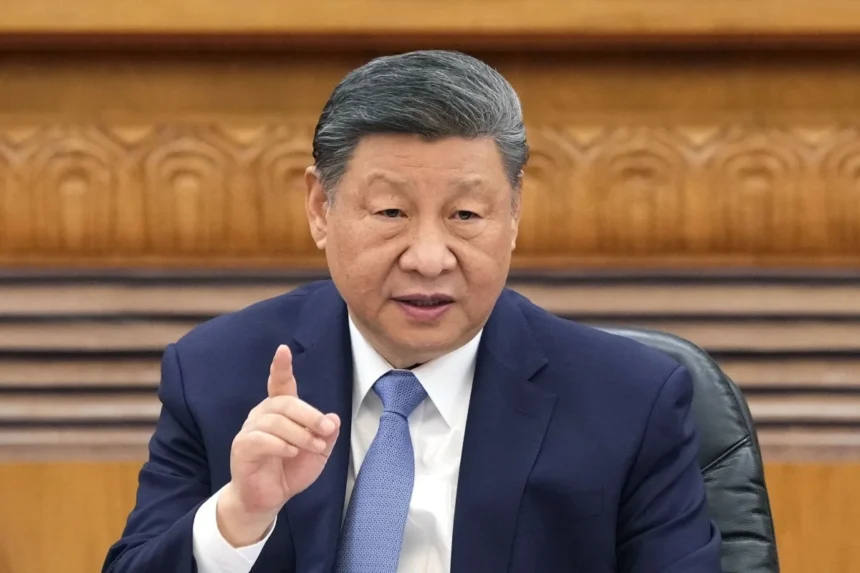China has accused the United States of “provoking new economic and trade frictions,” pushing back against claims by President Donald Trump that Beijing violated the trade truce the two countries reached just weeks ago.
In a statement Monday, China’s Commerce Ministry said it was “strictly implementing” the consensus from the recent Geneva trade talks. It blamed the US for actions that “seriously undermine” the agreement.
“The United States has been unilaterally provoking new economic and trade frictions, exacerbating the uncertainty and instability of bilateral economic and trade relations.
“If the United States insists on its own way and continues to undermine China’s interests, China will continue to take resolute and forceful measures to safeguard its legitimate rights and interests,” the ministry said.
The remarks came after Trump posted on Truth Social Friday that China had “TOTALLY VIOLATED ITS AGREEMENT WITH US.”
He said he made a quick deal with China to “save them from what I thought was going to be a very bad situation,” then added, “So much for being Mr. NICE GUY!”
Tensions are once again flaring just a month after both sides agreed to pause their tariff war.
The Geneva truce rolled back steep mutual tariffs and set a 90-day window to reach a broader deal. But now, talks are reportedly “stalled,” with both nations accusing each other of bad faith.
One major flashpoint: China’s export controls on rare earth minerals — essential components in electronics, electric vehicles, and military gear.
US officials had expected those restrictions to be eased under the truce. But three officials told CNN that China hasn’t budged, prompting frustration inside the Trump administration.
In response, Washington has taken new steps against China’s tech and education sectors.
Last month, the US warned companies against using AI chips made by Chinese tech giant Huawei.
Then, it moved to limit sales of certain American technologies to China and cut back on student visas for Chinese nationals.
Beijing hit back. The Commerce Ministry said the US had “successively introduced a number of discriminatory restrictive measures” since the Geneva talks — including AI chip export rules, bans on chip design software sales, and visa restrictions.
The standoff comes as China’s economy shows signs of strain.
Manufacturing activity fell for a second straight month in May, according to an official survey released Saturday.
Meanwhile, US tariffs on Chinese goods now stand at 30%, not including older duties.
At the center of the dispute are rare earth minerals. On April 4, China imposed controls on seven such minerals.
While not an outright ban, shipments now require government approval — a system that gives Beijing tight control over the global supply chain.
Under the Geneva deal, China had agreed to “suspend or remove” non-tariff measures enacted since April 2. But CNN reporting suggests the export controls remain in place.
On CBS’ Face the Nation Sunday, US Treasury Secretary Scott Bessent said China was “withholding some of the products that they agreed to release.”
“Maybe it’s a glitch in the Chinese system, maybe it’s intentional,” he added.
Bessent said the issue would be resolved when Trump and Chinese President Xi Jinping speak — a call he expects to happen “very soon.”
The last known conversation between the two leaders was on January 17, just days before Trump’s inauguration.
China continues to defend its export control rules.
At a Friday briefing, a Foreign Ministry spokesperson said the policy is “in line with international practices” and “not targeted at specific countries.”
Beijing also said it is “willing to strengthen dialogue and cooperation in the field of export controls with relevant countries and regions.”
Former US Ambassador to China Nicholas Burns said Beijing has been “difficult” in negotiations.
Speaking to CNN, he said, “A lot of this is on China — China has been the most disruptive force in global trade over the last 25 to 30 years.
“China has to prove to the United States on intellectual property, on forced technology transfer, that it’s going to be a responsible trading partner of the United States.”
As both countries dig in, the Geneva truce looks increasingly fragile — and the path toward a stable trade relationship more uncertain than ever.
(CNN)
ALSO READ TOP STORIES FROM NIGERIAN TRIBUNE
WATCH TOP VIDEOS FROM NIGERIAN TRIBUNE TV
- Relationship Hangout: Public vs Private Proposals – Which Truly Wins in Love?
- “No” Is a Complete Sentence: Why You Should Stop Feeling Guilty
- Relationship Hangout: Friendship Talk 2025 – How to Be a Good Friend & Big Questions on Friendship
- Police Overpower Armed Robbers in Ibadan After Fierce Struggle






